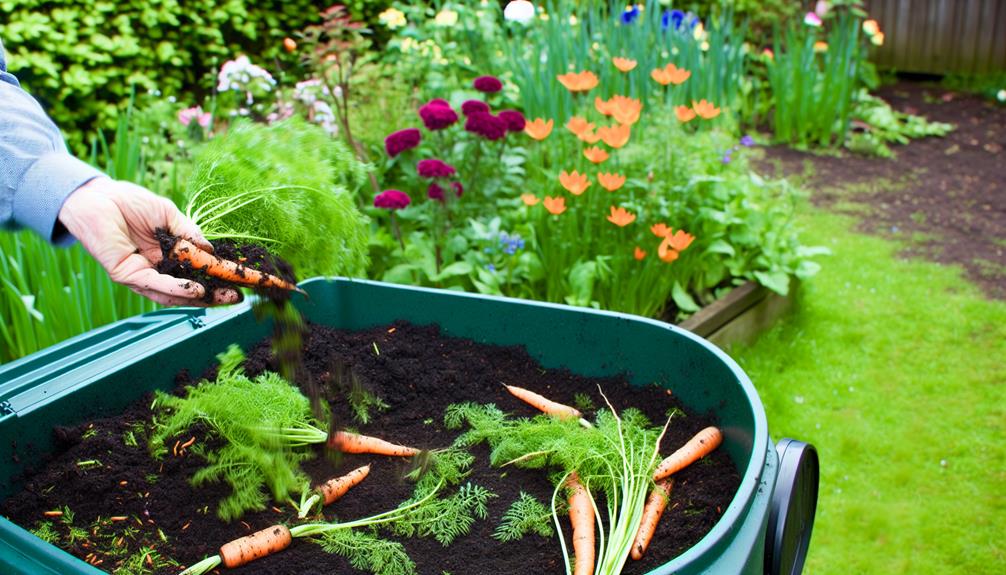

Absolutely, you can compost carrots! Composting carrot scraps, peelings, and tops can greatly enhance your soil’s fertility, thanks to their rich nitrogen content. Start by cutting them into smaller pieces to accelerate decomposition and guarantee proper airflow in your compost pile. Carrot tops are also a fantastic addition, providing essential nutrients and promoting healthy plant growth.
Mixing your carrot waste with carbon-rich materials like leaves creates a balanced compost pile, optimizing moisture and nutrient levels. By composting carrots, you’re not only reducing waste but also cutting down on methane emissions. Want to know how to make your compost even better? Keep going!
Composting carrots is a fantastic way to boost your soil’s fertility while reducing landfill waste. By composting, you’re turning organic carrot waste into valuable nutrients for your garden.
Carrots, rich in nitrogen, break down quickly, aiding in the decomposition process. This not only provides essential nutrients but also promotes healthy soil structure and microbial activity.
When you cut carrots into smaller pieces, you speed up their decomposition, making your compost pile more efficient.
Embracing this environmentally conscious practice helps reduce waste and methane emissions, benefiting both your garden and the planet. Joining the composting community means you’re part of a sustainable movement, working together to create a greener future.
Let’s make composting a natural part of our daily routine!
Also Read: Can You Compost Basil?
To prepare carrot scraps for composting, start by cutting them into smaller chunks. By chopping carrots into smaller pieces, you accelerate decomposition, making it easier for microbes to break them down. This method guarantees your compost pile gets proper airflow, which is vital for efficient carrot composting.
Don’t forget, carrot peelings break down rapidly, adding valuable nutrients like nitrogen to your compost mix. Including carrot tops in your compost adds even more organic material. Mixing carrot waste with carbon-rich materials, such as dry leaves or straw, creates a balanced pile.
Preparing carrot scraps this way not only speeds up the composting process but also enriches your soil with essential nutrients, fostering a healthier garden community.
Carrot tops add valuable nitrogen and nutrients to your compost pile, making them an excellent addition for enriching soil. By incorporating these leafy greens into your composting process, you’ll promote healthy plant growth.

Start by chopping carrot scraps into smaller pieces to accelerate decomposition. Remember to balance brown and green composting materials, maintaining proper moisture levels.
Using a compost thermometer can help you monitor the pile’s temperature, ensuring ideal conditions. What’s more, you can regrow vitamin-rich leafy carrot tops before composting, adding even more valuable nutrients.
This method not only enriches your soil but also creates a sense of community and belonging among fellow composting enthusiasts. Together, you’ll make a positive impact on your garden and the environment.
Also Read:Can You Compost Artichoke?
You can find numerous innovative and practical ways to repurpose carrot waste beyond traditional composting methods. Embrace these creative ideas to make the most out of your carrot scraps and contribute to a more environmentally conscious lifestyle.
Repurposing carrot waste not only reduces waste but also enriches your gardening and pet-feeding routines.
Also Read: Can You Compost Asparagus?
Composting carrot scraps offers a multitude of benefits for both your garden and the environment. By adding carrot tops and smaller carrot pieces to your compost pile, you’re enriching it with essential nutrients that promote soil health.

Carrots, known for their high nitrogen content, accelerate decomposition and support microbial activity. Their moisture levels help balance the carbon-to-nitrogen ratio, ensuring efficient composting.
| Benefit | Impact |
|---|---|
| High Nitrogen Content | Accelerates decomposition |
| Essential Nutrients | Improves soil health |
| Moisture Levels | Balances carbon-to-nitrogen ratio |
| Reduce Waste | Supports sustainable waste management |
Composting carrots not only reduces waste but also cuts down on landfill methane emissions, making it a key part of sustainable waste management. So, let’s compost those carrot greens and scraps!
You shouldn’t compost onions, garlic, citrus peels, dairy, meat, fish, bones, greasy foods, or diseased plants. These items can cause odors, attract pests, slow decomposition, or spread diseases, disrupting your community garden’s harmony.
Yes, carrot peels are great for compost. They decompose quickly, enriching your compost with essential nutrients like nitrogen. You’ll also help balance the carbon-to-nitrogen ratio and reduce landfill waste, promoting sustainable practices.
Absolutely, you can compost spoiled vegetables! They add essential nitrogen and moisture, enriching the compost and aiding decomposition. Just make sure they’re contaminant-free. Composting spoiled veggies also reduces landfill waste and supports sustainable living.
Yes, you can compost moldy carrots! They break down well, adding beneficial microorganisms. Just make sure you turn the pile for proper aeration. Your garden will love the nutrient-rich compost you create together.
Composting carrots is an incredibly rewarding practice that benefits both your garden and the environment. By composting carrot scraps and tops, you’re reducing waste and enriching your soil with valuable nutrients.
Plus, it’s easy to prepare carrot scraps for the compost bin, and there are plenty of alternative uses for carrot waste if composting isn’t your thing.
Embrace composting carrots, and you’ll see healthier plants and a more sustainable lifestyle in no time!
